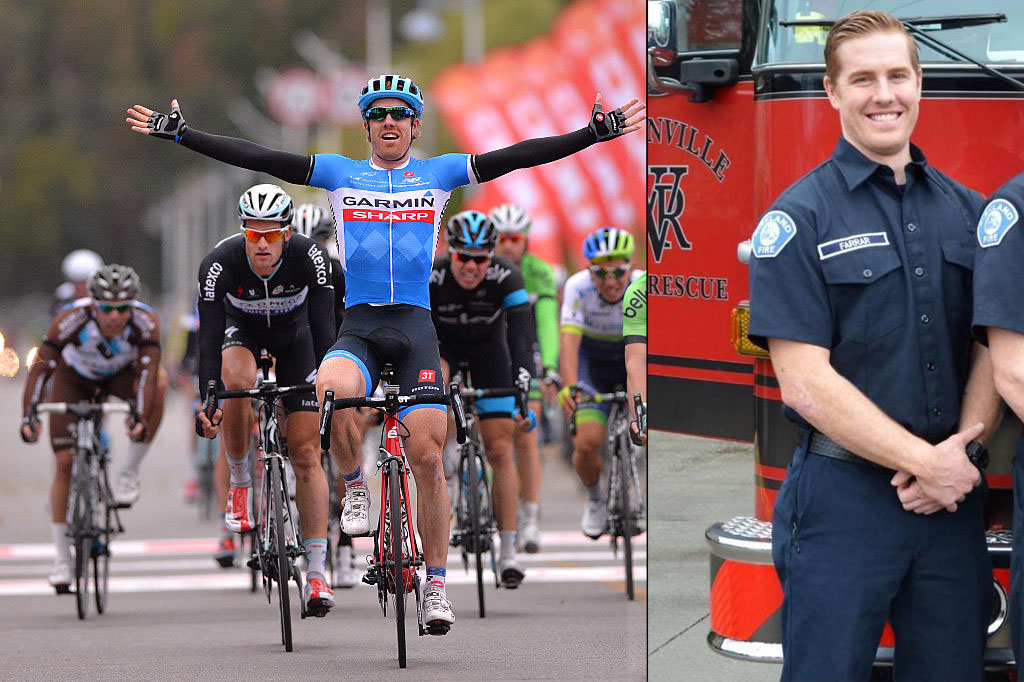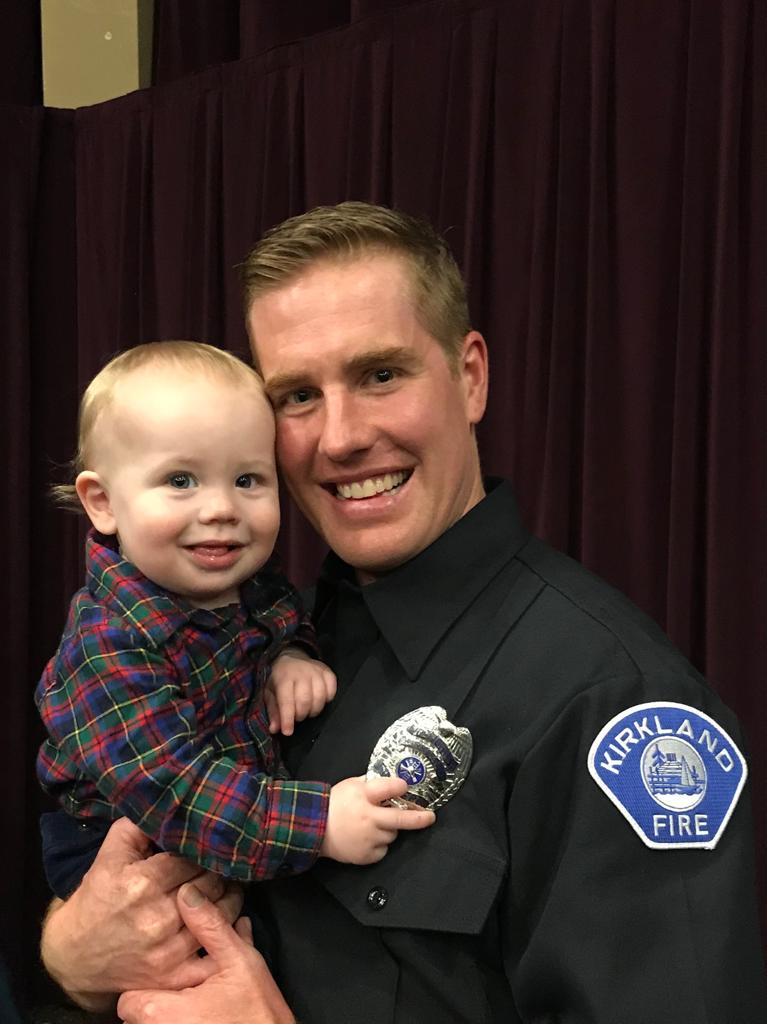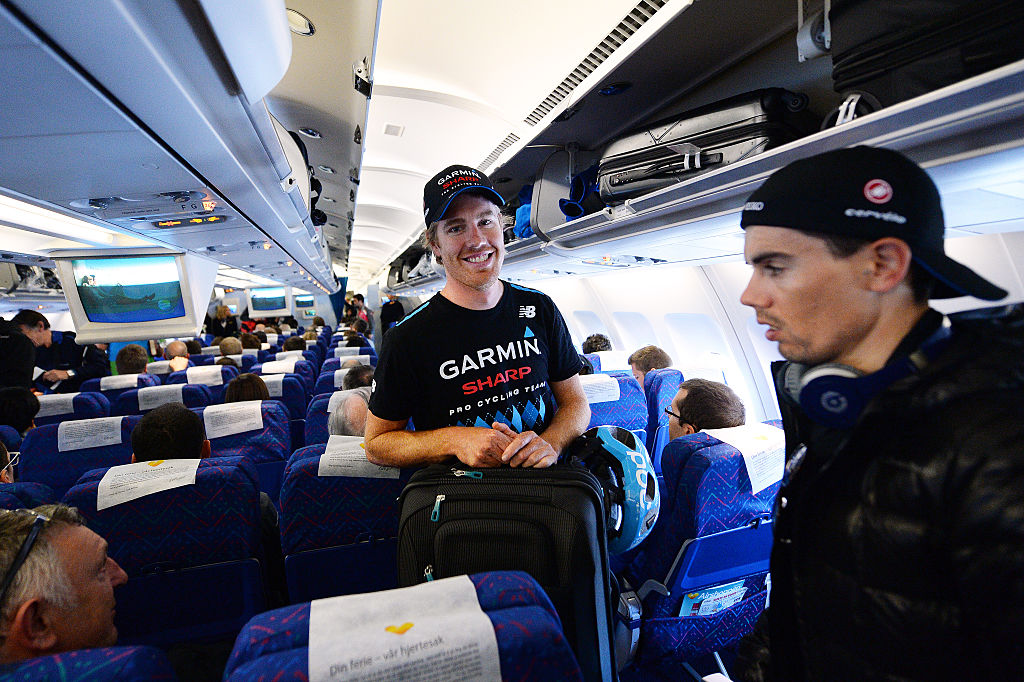Firefighter Farrar: From one dream job to another
'I never wanted the fame of professional cycling' says American

Three years ago, Tyler Farrar hung up his wheels and left professional cycling. He packed up his apartment in Gent, bought a one-way ticket back to the States, and began a new chapter of his life.
There was no grand farewell upon leaving Europe, no tell-all retrospective interview, and no au revoir Tweet. Nothing.
One day he was there, amid a racing peloton, and the next he was gone.
It’s almost 6 a.m in Kirkland, Washington and, as the sun begins to slowly rise over Seattle, firefighter T. Farrar goes about his morning checks. First up, he looks over the rig and makes sure that all the necessary equipment is in place. With everything accounted for and secure, he can now look over his own gear.
His day doesn't start for another hour, so there’s time for one quick coffee before a 48-hour shift starts. It’s two days on, two days off, but, as a front liner in the US right now, call-outs are frequent, especially in Seattle, where the coronavirus pandemic has been prevalent.
Farrar moved back to the US in the fall of 2017, bringing down the curtain on a career that spanned more than a decade and in which he won stages in all three Grand Tours. The then 32-year-old could have conceivably carried on for another year – at least – but by the time he finished his final race in Canada he had known for some time that he was ready to move on.
Joining the fire service had always been at the back of his mind, even when he was a young kid kicking ass on the track back home in his early teens, but when the wins started to flood in he understandably chose to follow one dream while the other was put on hold.
Get The Leadout Newsletter
The latest race content, interviews, features, reviews and expert buying guides, direct to your inbox!
"Being a firefighter was always something that sat in the back of my head when I was racing. I wanted to do it when I was a kid but I was having a lot of success racing bikes, but firefighting was always a job that I wanted to pursue once I knew that cycling was over for me," Farrar tells Cyclingnews from his home on the west coast.
"When I stopped cycling I just went straight into trying to be a firefighter and I gave it the same level of dedication."

After moving back to the US, Farrar spent the first few months settling back into normal life. He hunted a lot, 'like a maniac’, he jokes, but used the winter to properly prepare himself for the next chapter of his life. While many pros in his position struggle for direction, Farrar admits that he was lucky that he had a plan.
"I then put myself through the programme to be an emergency medical technician, and then put myself through fire academy and, as soon as 2018 rolled around, I started applying to fire departments. Luckily enough, I managed to get hired pretty quickly."
A decade ago, Farrar was at the peak of his powers and a central pillar of the Slipstream roster. These days, he’s part of a new crew and a new family. He no longer lives out of a suitcase but sees similarities in the camaraderie that’s shared between his new colleagues and those from a previous time in his life. There are substantial differences, too.
Farrar has swapped a lycra uniform for protective clothing and, instead of advertising Transitions, he’s out there saving lives. Anyone who thinks those two occupations are in any way similar probably should have their eyes tested.
"There are a lot of similarities, culturally," he says. "That’s why I like it. There’s a team atmosphere and you have your own crew and your station. That’s similar to being on a team bus but the job is totally different.
"We’re an all-hazards fire department so in addition to firefighting we’re who shows up if you’re having a medical emergency. Every shift I work is dynamic, and I don’t know what I’m going to face. I’m still learning and every day is different but it’s been a really good fit for me."
Down at the station, Farrar goes about his duties as if he’s just another member of the team. He’s still one of the rookies – a neo-pro if you will – and while the rest of crew know about his past as a former pro athlete, it doesn’t alter day-to-day duties.
Farrar modestly goes about his job as if frequently training and re-training. Whether you’re a former Olympian or not doesn’t really enter the equation.
"People know what I used to do and there’s a group in my department who follow racing, and know the races that I competed in. Everyone knows the Tour and the Olympics, so if you’ve done those things, even they’re a cycling fan or not, they can recognize those events," he says.
"At the end of my cycling career I was the experienced veteran and then I turned around and became the new guy. It was really refreshing but I was basically a neo-pro again. In your first year, you’re on probation and you’re under the microscope."
Through with the past
While Farrar is content and enjoying a settled lifestyle – he and his better half had their first son two years ago – there is the obvious question as to whether he misses the cut and thrust of professional cycling. Some athletes really struggle with the very notion of retirement, while others face daunting prospects when it comes to both the assimilation into real life and the search for a job.
Part of the reason as to why Farrar has perhaps found 'real-life' easier is because he never let his feet get off the ground. Even when he was winning WorldTour races and beating the likes of Mark Cavendish, he always appeared humble and appreciative of his situation. He calls a lot of what he’s done luck, but that’s just his modesty shining through.
"I was pretty comfortable in my decision to stop," he says. "I knew that this was what I wanted to do, years before I stopped cycling. I didn’t really talk about it a lot or make a big deal about it but I knew that I wanted to become a firefighter.
"It made the transition really easy for me. I didn’t just stop racing and then think ‘now what?’ I had a pretty firm plan in place. It made for a very easy transition because in cycling I always knew what my objectives were and what I was working towards and when I went into firefighting I still had goals but they just shifted.
"Don’t get me wrong. I loved traveling all over the world and pro life. Living abroad was really special to me and if I lived my life over I’d do it the same in a heartbeat but I was ready to put down roots in one place and I wanted something where I wasn’t on the road all the time."
While much of Farrar’s life has changed in the last few years, several consistencies have remained. He still rides, although mostly off-road, and the dedication and heart he put into racing have been transferred to his new calling.
His remote relationship with social media also remains. Farrar was never a fan of Facebook or Twitter. He still has neither, and the same goes for Instagram, and one presumes TikTok, and whatever else is being rammed down throats these days.

Part of that distance, though, stems from the fact that, as a pro rider, Farrar never immersed himself in the media side of things. That’s not a criticism at all. We probably all wish we could put down our phones a bit more these days but, for an athlete, image and engagement are important elements.
These days, everyone with sponsorship has a duty to 'represent' and while Farrar never downed tools when it came to legitimate interview requests, he always felt uncomfortable with the notion of having a persona in the media.
"I’m off the grid. If I could get by without having an email address I would," he jokes.
"I never wanted the 'fame' of professional cycling. That wasn’t why I did it. I loved the sport and the competition, and I loved having objectives that I was building towards. I loved having these targets that you’d build up to during the winter but the media attention and what celebrity came with that, that’s what I liked the least. I was never comfortable with it and it was almost a relief when I retired.
"I became friends with a lot of journalists. It wasn’t that I disliked talking to them but there was always something a bit uncomfortable about it. Every time I gave an interview there was always something deep down inside that didn’t feel quite right. It’s a weird place to be. Cycling is a small world, it’s not on the same level of some other sports, but it was weird that some people would know who I was and that was always so strange for me."
Farrar is more relaxed these days. There’s real pressure when it comes to his day job now but it’s a different world to the one in which the media are focusing on your every move, every sprint, and every mistake. He still has friends in the bunch, although, with each passing year, those numbers drop. Still, there are no regrets and no bad feelings.
Instead, Farrar is grateful for the career he had. There were tough times, no doubt, but overall he lived out every dream he had from the outset and achieved more on two wheels that many could ever hope for. In his words, one dream has finished but the next one has only just started.
"I feel like I really moved from one dream job to another dream job. I’ve been lucky in that regard," he says.
"I got to live my dream and it was fantastic. I was really lucky to have done that but I was ready to close that chapter and move forward with my life."
Daniel Benson was the Editor in Chief at Cyclingnews.com between 2008 and 2022. Based in the UK, he joined the Cyclingnews team in 2008 as the site's first UK-based Managing Editor. In that time, he reported on over a dozen editions of the Tour de France, several World Championships, the Tour Down Under, Spring Classics, and the London 2012 Olympic Games. With the help of the excellent editorial team, he ran the coverage on Cyclingnews and has interviewed leading figures in the sport including UCI Presidents and Tour de France winners.
